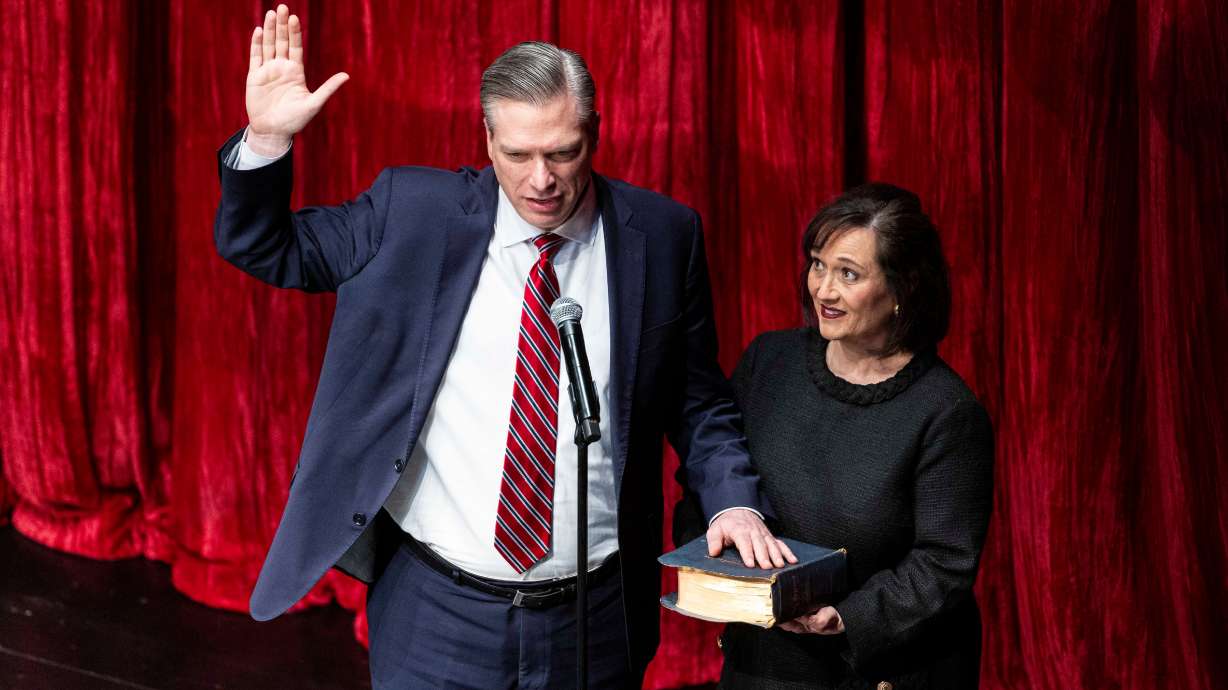Estimated read time: 5-6 minutes
- Utah Treasurer Marlo Oaks criticizes the politicization of treasuries.
- Oaks argues certain practices harm the economy, affecting U.S. companies and energy costs.
- He supports legislative measures on precious metals and opposes natural asset companies in Utah.
SALT LAKE CITY — Utah Treasurer Marlo Oaks spoke about the attempt to politicize treasuries across all levels of government in remarks to the Utah County Liberty Forum at the Provo Library on Wednesday.
Oaks, who has served as state treasurer since 2021, is a nationally recognized voice on fiscal public policy issues, having published op-eds in The Wall Street Journal, Fox Business and elsewhere.
The Utah treasurer attributes this recognition to his background. "I am one of two state treasurers who have a background in institutional investment management," Oaks said. The other is South Carolina's Curtis Loftis.
One of the issues Oaks has been outspoken on is environmental, social and governance issues — or the practice of investing in companies based on their ESG "score," or their position on issues like climate change and gender equality.
In November 2023, Oaks testified to the U.S. House Ways and Means Committee about how it harms the American economy and retirement security.
"ESG has created an uncontrollable impulse to pressure corporations to solve complex global and societal issues," Oaks said in his 2023 testimony. "These issues, such as climate, income inequality, guns and abortion, to name just a few, should be in the purview of a democratically elected government."
He continued, "ESG hijacks corporate governance to advance ideological objectives, often divorced from and detrimental to long-term shareholder value."
In his remarks in Provo on Wednesday, Oaks added that environmental, social and governance issues are already widely implemented across Europe "through sweeping, top-down rules" enforced by the European Union.
"If you do business in the EU and you're a certain size, you're going to have to do reporting like what we prevented happening in the United States," Oaks said. This could include reporting what your supply chain emissions are, even if they are largely outsourced.
He added, "What gets measured gets managed."
"The problem is, it drags in U.S.-based companies into reporting on all of their operations, even though they're not based in Europe," Oaks said.
Outside of these international problems, Oaks added that energy within the EU is four times more expensive than it is in the States, and he attributes this increased cost to the bureaucratic regulations brought on by environmental, social and governance issues.
Oaks sees attempts to politicize the treasury
From cities to states to the federal government, treasuries were intended to operate apolitically, Oaks said. However, he said members in his own department have seen federal agencies pushing to politicize state treasuries.
"It's across the board," he said. "I had somebody from my staff who attended a National State Treasurers conference — this is the bipartisan conference for state treasurers — he went to the bonding session, and they talked about racial equity bonding and how to attack social justice issues through issuing bonds."
After this first conference, the treasury employee, whom he did not name, went to the national meeting for the League of Cities and Towns, "and they talked about racial equity bonding. Same thing, completely different organization," Oaks said.
Oaks believes this kind of training for local leaders is being initiated by the World Economic Forum and other global nongovernmental organizations.
Oaks comments on bills he worked on last legislative session
In addition to his own office's duties, Oaks was involved in helping the Utah Legislature with several bills, including the HB306, Precious Metals Amendments.
This bill would have allowed Utah to pay vendors using gold, if vendors were open to it.
"States are not allowed to have their own currency," Oaks explained, "But they are allowed to use gold and silver to pay off debt." This bill was passed by the Legislature but was vetoed by Gov. Spencer Cox.
Oaks also aided legislators with HB348, which allowed the state treasurer to invest up to 10% of the state's rainy day funds in precious metals, and it commissioned a study related to precious metals.
"Because of technological advancements, we can now transact in gold very easily. You can essentially use gold today as easily as a debit card," Oaks said.
He added that gold has tended to do well in recessions.
HB464 and SB323 are two other bills the treasurer helped the legislature with, which created the State Sovereignty Fund and the Asset and Investment Review Task Force, respectively.
Natural asset companies are bad for Utah, Oaks says
As proposed by the New York Stock Exchange, natural asset companies are structured as corporate entities, and they "assign financial value to ecosystem services like carbon sequestration, water purification, biodiversity preservation and soil health," per previous Deseret News reporting.
Essentially, natural asset companies "stop all economic activity on the land," Oaks said.
In Utah, 64.9% of the land is federally owned, and 73% of grazing happens on federal land, "so we're talking about the destruction of our economic livelihoods," Oaks said.
Federal Utah representatives and senators, including Mike Lee, John Curtis and Mike Kennedy, have proposed a bill to block natural asset companies from making agreements affecting land, water or other natural resources in the state.
"Land is a critical resource for society, and once you put a perpetual conservation lease on that land, you have fundamentally changed the value of that land for society as a whole," Oaks said.
He added, "It's a big problem."








